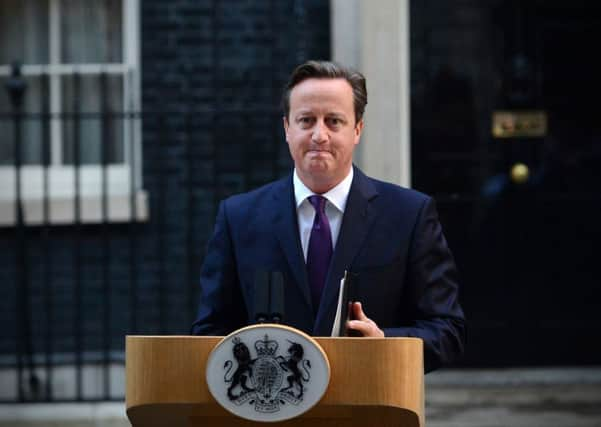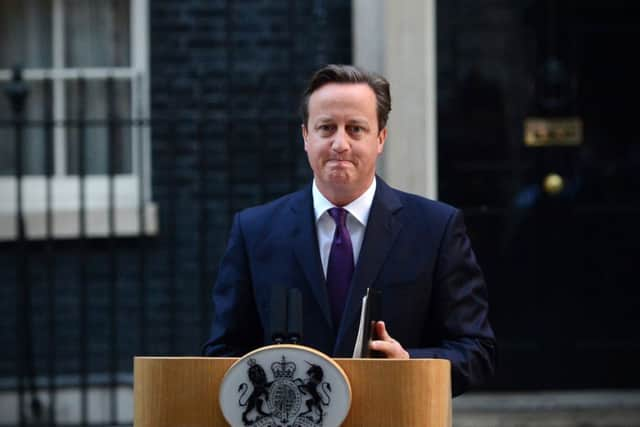Scottish independence: Cameron’s powers pledge


The Prime Minister was given the news that Scotland’s independence referendum had gone the way he wanted in the early hours of yesterday. At 7am, he strode out of No 10 Downing Street to deliver a statement pledging to honour “in full” his government’s commitment to extra powers for Holyrood.
Standing outside Number 10 at 7am yesterday morning, the relief was clear for all to see when he declared that it would have “broken his heart” to see Britain’s relationship with Scotland come to an end.
Advertisement
Hide AdAdvertisement
Hide AdIt came at the end of a campaign that was won in no small measure after a vow by him, Nick Clegg and Ed Miliband to offer more powers for Holyrood on a speedy timetable that negated the risks of independence.


“The people of Scotland have spoken and it is a clear result,” Mr Cameron said. “They have kept our country of four nations together and, like millions of other people, I am delighted.
“So now it is time for our United Kingdom to come together and to move forward. A vital part of that will be a balanced settlement, fair to people in Scotland and, importantly, to everyone in England, Wales and Northern Ireland as well.”
Mr Cameron’s statement made clear Scotland’s precarious relationship with the Union had the potential to recast the constitutional relationship among the other nations of the UK as well.
He said he would implement a solution to the West Lothian Question, which will mean Scots MPs are no longer allowed to vote on issues that only concern England.
“Just as Scotland will vote separately in a Scottish parliament on their issues of tax, spending and welfare, so too England, as well as Wales and Northern Ireland, should be able to vote on these issues, and all this must take place in tandem with and at the same pace as the settlement for Scotland,” he said.
He said there would have to be reform to address the thorny issue of “English votes for English laws”, suggesting Scots MPs would no longer be able to vote on exclusively English issues.
But there were early signs that the plan would not be straight-forward when it was dismissed by Labour – whose chances of forming a majority government at Westminster are likely to depend on Scottish votes – as a “knee-jerk reaction” driven “more by politics than by a considered judgement of the needs of the constitution”.
Advertisement
Hide AdAdvertisement
Hide AdThe tension between the two main Westminster parties on this issue was made clear when Conservative MPs said they were not prepared to tolerate a situation where Scottish MPs could vote on the level of income tax for England while income tax in Scotland was decided by MSPs in Holyrood.
Speaking shortly after the results of the referendum became clear, Labour leader Mr Miliband said Scotland’s decision was a “vote for change”. In a speech at the Emirates Arena in Glasgow, where he was joined by the Better Together leader Alistair Darling, Mr Miliband also had a message for disappointed Yes voters.
He said: “This was a vote for No because we know we are better together. To all the people who voted Yes, this Labour Party is determined to show that we can be the vehicle for your hopes, your dreams your aspirations, for a better life for you, a better life for Scotland, a better life for the whole of the United Kingdom.
“Whether people voted No or Yes, let us be absolutely clear, this was a vote for change.”
An hour before Mr Cameron’s announcement, Alex Salmond had addressed the nation from a campaign base at Our Dynamic Earth in Edinburgh, conceding defeat from behind a blue “One Scotland” lectern. Unconfirmed rumours began to circulate that the First Minister could to step down following his crushing defeat.
Meanwhile, the financial markets steadied yesterday as they reacted to news that the volatility feared from a break-up of the UK would not happen.
Scottish companies led the way in a market rally as investors ruled out headquarters’ relocations in the financial sector. The FTSE 100 Index rose in early trading but remained short of the 100-point surge predicted earlier in the morning.
Shares in Royal Bank of Scotland rose by 3.5 per cent while energy firm SSE, Glasgow-based engineer Weir and Standard Life were all up by about 2 per cent during trading on the London Stock Exchange.
Advertisement
Hide AdAdvertisement
Hide AdRBS, Lloyds Banking Group and insurance firm Standard Life had indicated they would consider a move south if Scotland had opted to split from the rest of the UK.
While RBS and Standard Life made it clear yesterday that their plans to leave Scotland would be abandoned, it is believed Lloyds may still consider moving some of its businesses in a review later this year. In a short statement issued to the Stock Exchange, Lloyds said it would keep a “significant presence” in Scotland and that it is focused on supporting lending to homebuyers and companies there. A spokesman for the bank declined to comment further.
The pound also enjoyed a surge, climbing by almost 1 per cent overnight to as high as £1.65 against the US dollar after the referendum result was known as traders reacted to the first poll results showing support for the No campaign.
Chris Williams, chief executive of online investment advice service, Wealth Horizon, said: “The uncertainty around the outcome of the referendum has been playing on the minds of investors over the last couple of months, many of whom were wary of what impact independence for Scotland might have on the markets.”
The future of Britain’s economy became more certain as ratings agency Fitch reported that while continued uncertainties surrounding more powers for Scotland could affect Britain’s high level sovereign rating, it was unlikely to cause major financial ructions.
Fitch said that the prospect of further tax and spending powers for Scotland which have been promised by the Westminster government, was unlikely to trigger excessive borrowing.
“Scotland’s small share of the overall UK economy, and the relatively conservative limits set on Scottish borrowing, mean that the fiscal risks posed by further Scottish devolution are not high in our opinion,” the agency said.
Scotland’s business community, which had raised fears over the viability of an independent Scotland through CBI director-general John Cridland, said the No result would be “greeted by a collective sigh of relief across the business community”.
Advertisement
Hide AdAdvertisement
Hide AdMr Cridland said: “Business has always believed that the Union is best for creating jobs, raising growth and improving living standards, and welcomes that the people of Scotland want to play an integral role in this internationally successful partnership.”
While the United Kingdom remained intact, there was less surety about Mr Salmond.
The First Minister had left Dynamic Earth and returned to his official Bute House residence in Charlotte Square, where he discussed his next move.
At some point in the morning, he had a tense phone call with Mr Cameron to discuss the proposals the Prime Minister had announced earlier. The call did not go well.
Mr Salmond was later to claim that the conversation he had had with Mr Cameron was a key driver behind his decision to quit.
Across the city at the Scottish Parliament, journalists were still waiting to hear when he would hold his press conference. Lunchtime came and went, still no news.
As he mulled over his call with the Prime Minister, Mr Salmond discussed his future with a few trusted advisers. His political career, indeed his whole life, had been about Thursday.
The referendum was the key date in his remarkable rise from the hurly-burly of student politics with the SNP at St Andrews University, through the turbulent years of the party’s struggle for mainstream acceptance and his elevation to high office.
Advertisement
Hide AdAdvertisement
Hide AdThroughout this time, he had dreamed of the opportunity that presented itself this week.
It had been a remarkable achievement to lead a Scottish Government, to gain a Holyrood majority and finally to secure a referendum. But ultimately, he had failed at the most important hurdle of all.
Across the country, his loyal footsoldiers were exhausted. At that time, save from the journalists, there was little speculation about Mr Salmond’s future.
Speaking ahead of Mr Salmond’s announcement that he would stand down, the former SNP leader Gordon Wilson said he believed that a Yes vote of 45 per cent was enough to ensure that the First Minister would stay in office without feeling he had to quit.
Had the vote been much lower, things might have been different, Mr Wilson said.
Then came Mr Salmond’s press conference at Bute House. At 3:30pm, journalists gathered on the pavement outside the Georgian town house before they were ushered inside and waited expectantly for Mr Salmond.
Despite the casual speculation that he might go, his announcement came like a bolt from the blue.
As he explained his decision, Mr Salmond claimed Mr Cameron was not prepared to commit to a second reading in the House of Commons for the more powers legislation by 26 March next year.
Advertisement
Hide AdAdvertisement
Hide AdMr Salmond claimed the Prime Minister had broken a “clear promise” on the timetable to delivering more powers – a statement that was disputed by the Conservatives who said that the date was not in the delivery plan signed by the three UK party leaders after it was presented by Gordon Brown during the campaign.
That was a key reason why he had decided to stand down, Mr Salmond said. As he joined Labour’s Henry McLeish to double the roll-call of First Minister’s who have left while in officer, he also accepted that after defeat in the referendum it was time to make way for a new face.
At the end of an astonishing week in Scottish and UK politics, it was left to the Queen to have the last word. From her home at Balmoral in Royal Deeside, the Queen issued a carefully worded statement that called for unity.
She urged people across Britain to unite in an “enduring love of Scotland”.
SEE ALSO